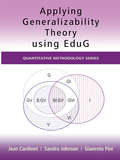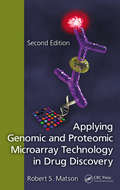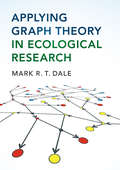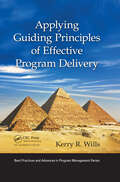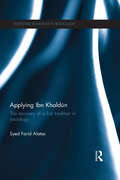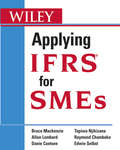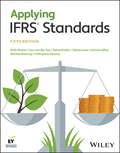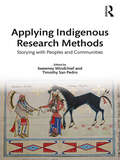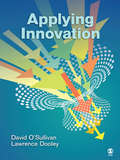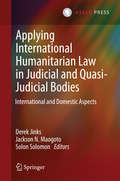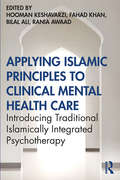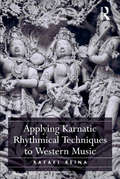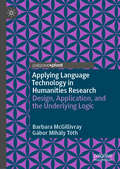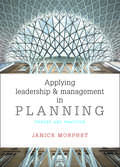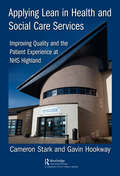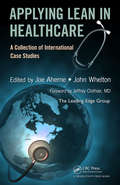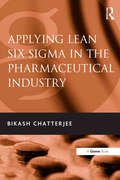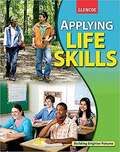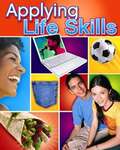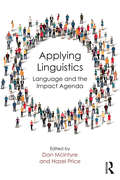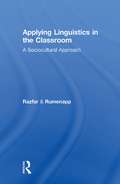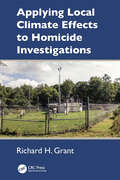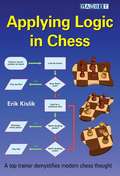- Table View
- List View
Applying Generalizability Theory using EduG (Quantitative Methodology Series)
by Sandra Johnson Jean Cardinet Gianreto PiniIntended to help improve measurement and data collection methods in the behavioral, social, and medical sciences, this book demonstrates an expanded and accessible use of Generalizability Theory (G theory). G theory conceptually models the way in which the reliability of measurement is ascertained. Sources of score variation are identified as potential contributors to measurement error and taken into account accordingly. The authors demonstrate the powerful potential of G theory by showing how to improve the quality of any kind of measurement, regardless of the discipline.Readers will appreciate the conversational style used to present a comprehensive review of G theory and its application using the freeware EduG. To maximize understanding the authors illustrate all fundamental principles with concrete examples from different fields and contexts. Annotated applications lead students through the main concepts of G theory, while illustrating both the use of EduG and interpretation of its output. Formulas are avoided wherever possible. Exercises with data sets available on the Psychology Press website allow readers to carry out their own analyses to reinforce understanding. Brief overviews of analysis of variance, estimation, and the statistical error model are provided for review. The procedures involved in carrying out a generalizability study using EduG follow, as well as guidance in the interpretation of results. Real-world applications of G theory to the assessment of depression, managerial ability, attitudes, and writing and mathematical skills are then presented. Next, annotated exercises provide an opportunity for readers to use EduG and interpret its results. The book concludes with a review of the development of G theory and possible new directions of application. Finally, for those with a strong statistical background, the appendixes provide the formulas used by EduG. Ideal as a supplement for courses on measurement theory and/or generalizability theory taught in departments of psychology, education, medicine, and the social sciences, this text will also appeal to researchers from a variety of fields interested in learning how to apply G theory to their studies.
Applying Genomic and Proteomic Microarray Technology in Drug Discovery
by Robert S. MatsonMicroarrays play an increasingly significant role in drug discovery. The commercial landscape has changed dramatically over the past few years and researchers have made great advancements with regard to construction and use. Now in its second edition, Applying Genomic and Proteomic Microarray Technology in Drug Discovery highlights, describes, and
Applying Graph Theory in Ecological Research
by Dale Mark R. T.Graph theory can be applied to ecological questions in many ways, and more insights can be gained by expanding the range of graph theoretical concepts applied to a specific system. But how do you know which methods might be used? And what do you do with the graph once it has been obtained? This book provides a broad introduction to the application of graph theory in different ecological systems, providing practical guidance for researchers in ecology and related fields. Readers are guided through the creation of an appropriate graph for the system being studied, including the application of spatial, spatio-temporal, and more abstract structural process graphs. Simple figures accompany the explanations to add clarity, and a broad range of ecological phenomena from many ecological systems are covered. This is the ideal book for graduate students and researchers looking to apply graph theoretical methods in their work.
Applying Guiding Principles of Effective Program Delivery
by Kerry R. WillsWhile today's programs continue to grow in size and complexity, their success rates remain low. To manage programs effectively in this environment, project managers and program managers must take a consultative approach that applies a core set of guiding principles across every function of the program. This book explains what it means to take a consultative approach. Instead of focusing on specific program management techniques, it covers the guiding principles required to make those techniques effective-making it applicable to any program in any industry.
Applying Ibn Khaldūn: The Recovery of a Lost Tradition in Sociology (Routledge Advances in Sociology)
by Syed Farid AlatasThe writings of Ibn Khaldūn, particularly the Muqaddimah (Prolegomenon) have rightly been regarded as being sociological in nature. For this reason, Ibn Khaldūn has been widely regarded as the founder of sociology, or at least a precursor of modern sociology. While he was given this recognition, however, few works went beyond proclaiming him as a founder or precursor to the systematic application of his theoretical perspective to specific historical and contemporary aspects of Muslim societies in North Africa and the Middle East. The continuing presence of Eurocentrism in the social sciences has not helped in this regard: it often stands in the way of the consideration of non-Western sources of theories and concepts. This book provides an overview of Ibn Khaldūn and his sociology, discusses reasons for his marginality, and suggests ways to bring Ibn Khaldūn into the mainstream through the systematic application of his theory. It moves beyond works that simply state that Ibn Khaldūn was a founder of sociology or provide descriptive accounts of his works. Instead it systematically applies Khaldūn’s theoretical perspective to specific historical aspects of Muslim societies in North Africa and the Middle East, successfully integrating concepts and frameworks from Khaldūnian sociology into modern social science theories. Applying Ibn Khaldūn will be of interest to students and scholars of sociology and social theory.
Applying IFRS for SMEs
by Bruce Mackenzie Allan Lombard Danie Coetsee Tapiwa Njikizana Raymond ChambokoAn invaluable aid to companies and auditors involved in first-time adoption of the new SMEs standard Applying the IFRS for SMEs provides expert insights and explanations of the International Financial Reporting Standards (IFRS) for small and medium enterprises (SMEs) issued by the International Accounting Standards Board (IASB). This important book includes comprehensive coverage of this recently issued standard aimed at small and medium-sized businesses. Provides essential coverage for application of IFRS-now a necessity in the accounting world Includes Foreword by Paul Pacter, Director of Standards for SMEs, IASB Offers commentary on the theory in the standard, illustrative disclosures, comprehensive illustrative financial statements and comparisons to full IFRS Includes relevant real life worked out examples aimed at SMEs, plus summaries of important points The first book on how to apply the new SMEs standard, Applying the IFRS for SMEs is a must-have book for your small or medium-sized business.
Applying IFRS Standards (Wiley Regulatory Reporting)
by Ruth Picker Leo van der Tas David Kolitz Gilad Livne Janice Loftus Miriam Koning Cathrynne ServiceA comprehensive IFRS practice resource from leading accounting authorities In the newly revised fifth edition of Applying IFRS® Standards, a team of accounting experts delivers a comprehensive practice resource designed for accountancy students and accounting practitioners seeking to better understand the complexities of International Financial Reporting Standards (IFRS). The book begins with an overview of the International Accounting Standards Board (IASB) and explains how it establishes accounting standards, before moving on to a discussion of the key concepts and applications of IFRS. It offers insights and examples sourced from the international business world and addresses the skills you need to apply the standards in real-world business environments. In addition to a comprehensive factual breakdown of the IFRS Standards, parts of the book are accompanied by an academic perspective, which offers key relevant research findings. Applying IFRS® Standards provides discussion questions, exercises, and references, as well as complimentary access to a companion website that contains additional chapters, instructor slides, test banks, more exercises, a solutions manual, and new IFRS Learning Resources. This is an essential learning tool for students and early-career accounting professionals, as well as a useful desk reference for established accounting practitioners.
Applying Indigenous Research Methods: Storying with Peoples and Communities (Indigenous and Decolonizing Studies in Education)
by Sweeney Windchief Timothy San PedroApplying Indigenous Research Methods focuses on the question of "How" Indigenous Research Methodologies (IRMs) can be used and taught across Indigenous studies and education. In this collection, Indigenous scholars address the importance of IRMs in their own scholarship, while focusing conversations on the application with others. Each chapter is co-authored to model methods rooted in the sharing of stories to strengthen relationships, such as yarning, storywork, and others. The chapters offer a wealth of specific examples, as told by researchers about their research methods in conversation with other scholars, teachers, and community members. Applying Indigenous Research Methods is an interdisciplinary showcase of the ways IRMs can enhance scholarship in fields including education, Indigenous studies, settler colonial studies, social work, qualitative methodologies, and beyond.
Applying Innovation
by David O′Sullivan Lawrence DooleyA step-by-step approach to applying high-impact innovation principles in any organizationInnovation is an important force in creating and sustaining organizational growth. Effective innovation can mean the difference between leading with a particular product, process, or service—and simply following the pack. Innovation transforms mediocre companies into world leaders and ordinary organizations into stimulating environments for employees.Applying Innovation combines the key ingredients from areas including innovation management, strategic planning, performance measurement, creativity, project portfolio management, performance appraisal, knowledge management, and teams to offer an easily applied recipe for enterprise growth. Authors David O′Sullivan and Lawrence Dooley map out the main concepts of the innovation process into a clear, understandable framework—the innovation funnel. Unlike other texts for this course, Applying Innovation goes beyond methodologies and checklists to offer an invaluable step-by-step approach to actually applying high-impact innovation in any organization using a knowledge management systems, whether for a boutique firm or one comprised of thousands of individuals. Key Features:Adopts a practical approach to overseeing innovation that focuses on useful tools and techniques rather than on theory and methodologiesOffers student activities within the text for immediate application of key concepts, reinforcing retention and comprehensionTeaches students to build and apply effective innovation management systems for any organization successfully, regardless of the firm′s size or structure Intended Audience:Applying Innovation is designed for undergraduate and graduate courses such as Innovation Management, Project Management, Strategic Planning, and Performance Management in fields of business, science, and engineering. This book appeals to instructors who want to reduce the "chalk and talk" and increase the hands-on practicality of their courses in innovation management.
Applying International Humanitarian Law in Judicial and Quasi-Judicial Bodies: International and Domestic Aspects
by Derek Jinks Jackson N. Maogoto Solon SolomonThe work analyzes the impact and implementation of international humanitarian law in judicial and quasi judicial bodies. Moreover, acknowledging the high impact domestic jurisdictions have in the configuration of international law, the book does not rest only in an analysis of the international jurisprudence, but delves also into the question of how domestic courts relate to international humanitarian law issues.
Applying Islamic Principles to Clinical Mental Health Care: Introducing Traditional Islamically Integrated Psychotherapy
by Hooman KeshavarziThis text outlines for the first time a structured articulation of an emerging Islamic orientation to psychotherapy, a framework presented and known as Traditional Islamically Integrated Psychotherapy (TIIP). TIIP is an integrative model of mental health care that is grounded in the core principles of Islam while drawing upon empirical truths in psychology. The book introduces the basic foundations of TIIP, then delves into the writings of early Islamic scholars to provide a richer understanding of the Islamic intellectual heritage as it pertains to human psychology and mental health. Beyond theory, the book provides readers with practical interventional skills illustrated with case studies as well as techniques drawn inherently from the Islamic tradition. A methodology of case formulation is provided that allows for effective treatment planning and translation into therapeutic application. Throughout its chapters, the book situates TIIP within an Islamic epistemological and ontological framework, providing a discussion of the nature and composition of the human psyche, its drives, health, pathology, mechanisms of psychological change, and principles of healing. Mental health practitioners who treat Muslim patients, Muslim clinicians, students of the behavioral sciences and related disciplines, and anyone with an interest in spiritually oriented psychotherapies will greatly benefit from this illustrative and practical text.
Applying Karnatic Rhythmical Techniques to Western Music
by Rafael ReinaMost classical musicians, whether in orchestral or ensemble situations, will have to face a piece by composers such as Ligeti, Messiaen, Varèse or Xenakis, while improvisers face music influenced by Dave Holland, Steve Coleman, Aka Moon, Weather Report, Irakere or elements from the Balkans, India, Africa or Cuba. Rafael Reina argues that today’s music demands a new approach to rhythmical training, a training that will provide musicians with the necessary tools to face, with accuracy, more varied and complex rhythmical concepts, while keeping the emotional content. Reina uses the architecture of the South Indian Karnatic rhythmical system to enhance and radically change the teaching of rhythmical solfege at a higher education level and demonstrates how this learning can influence the creation and interpretation of complex contemporary classical and jazz music. The book is designed for classical and jazz performers as well as creators, be they composers or improvisers, and is a clear and complete guide that will enable future solfege teachers and students to use these techniques and their methodology to greatly improve their rhythmical skills. An accompanying website of audio examples helps to explain each technique. For examples of composed and improvised pieces by students who have studied this book, as well as concerts by highly acclaimed karnatic musicians, please copy this link to your browser: http://www.contemporary-music-through-non-western-techniques.com/pages/1587-video-recordings
Applying Language Technology in Humanities Research: Design, Application, and the Underlying Logic
by Barbara McGillivray Gábor Mihály TóthThis book presents established and state-of-the-art methods in Language Technology (including text mining, corpus linguistics, computational linguistics, and natural language processing), and demonstrates how they can be applied by humanities scholars working with textual data. The landscape of humanities research has recently changed thanks to the proliferation of big data and large textual collections such as Google Books, Early English Books Online, and Project Gutenberg. These resources have yet to be fully explored by new generations of scholars, and the authors argue that Language Technology has a key role to play in the exploration of large-scale textual data. The authors use a series of illustrative examples from various humanistic disciplines (mainly but not exclusively from History, Classics, and Literary Studies) to demonstrate basic and more complex use-case scenarios. This book will be useful to graduate students and researchers in humanistic disciplines working with textual data, including History, Modern Languages, Literary studies, Classics, and Linguistics. This is also a very useful book for anyone teaching or learning Digital Humanities and interested in the basic concepts from computational linguistics, corpus linguistics, and natural language processing.
Applying leadership and management in planning: Theory and Practice
by Janice MorphetPlanning is central to economic, social and environmental life but its practice is frequently criticised by all who engage in it. Seen as too restrictive by those who promote development and too weak by those opposing it, planners who advise on proposals cannot sit on the fence. Is it the planning system that is problematic or is it the planners who work within it? This valuable book examines these issues at the continuing professional development level and discusses the ways in which management theories, tools and techniques can be applied to planning practice and used by all who engage in it. Written by an experienced author and widely respected academic, the book includes case studies and question and answer sections, and will be valuable through both initial and continuous professional education, helping candidates prepare for examinations and subsequent management.
Applying Lean in Health and Social Care Services: Improving Quality and the Patient Experience at NHS Highland
by Cameron Stark Gavin HookwayOrganizations around the world are using Lean to redesign care and improve processes in a way that achieves and sustains meaningful results for patients, staff, physicians, and health systems. This book systematically describes how NHS Highland uses Lean principles and mindsets to improve safety, quality, access, and morale while reducing costs, and increasing capacity. Existing books often describe the gains obtained by using Lean methods, but often do not describe the underlying concepts and methods in details. Other books describe continuous improvement work, or specific techniques such as daily management in detail. This book seeks to occupy a middle space by providing an overview of the range of Lean ideas applicable to healthcare with sufficient examples and cases studies from NHS Highland and partner organizations so readers can see them in use and practice.
Applying Lean in Healthcare: A Collection of International Case Studies
by Joe Aherne John WheltonTypically entrenched and systemic, healthcare problems require the sort of comprehensive solutions that can only be addressed by a change in culture and a shift in thinking. Applying Lean in Healthcare: A Collection of International Case Studies demonstrates how honest appraisal, intelligent planning, and vigilant follow-up have led to dramatic imp
Applying Lean Six Sigma in the Pharmaceutical Industry
by Bikash ChatterjeeBikash Chatterjee emphasizes the criticality of applying the principles of Lean and Six Sigma within the paradigm of the drug development process. His guide to operational excellence in the pharmaceutical and biotech industries is a focused summary of the application of Lean Six Sigma theory to the regulated life sciences. From molecule discovery to the application of PAT Applying Lean Six Sigma in the Pharmaceutical Industry will highlight the importance of framing these initiatives within the key deliverables of drug development manufacturing and quality. Challenging conventional wisdom the author offers a quality and efficiency perspective as a foundation for the principles of Quality by Design, PAT and the new philosophies underlying Process Validation. Each chapter includes discussion around the considerations for applying Lean manufacturing and Six Sigma principles and their tools, culminating in a case study to illustrate the application. The book is organized to reflect the major work centers involved in the drug development lifecycle. Each chapter is stand-alone but together they illustrate the necessary synergy between Lean, Six Sigma and compliance sensibilities required to be successful in the pharmaceutical industry. These design, manufacturing and management techniques are not without their challenges. Bikash Chatterjee's book offers the roadmap for an industry that is struggling to reinvent many of its development and business processes.
Applying Lessons Learned from COVID-19 Research and Development to Future Epidemics: Proceedings Of A Workshop
by National Academies of Sciences, Engineering, and Medicine Health and Medicine Division Board on Global Health Forum on Microbial ThreatsThe COVID-19 pandemic catalyzed unparalleled speed and cross-sector collaboration in the innovation of tools and technologies to address an emerging infectious disease outbreak. Continued innovation and collaboration in rapid development and implementation of new vaccines, therapeutics, and diagnostics is central to future outbreak preparedness. The National Academies Forum on Microbial Threats; Forum on Drug Discovery, Development, and Translation; and the Forum on Medical and Public Health Preparedness for Emergencies and Disasters held a workshop in December 2022 to explore how innovative approaches in research can enhance health systems preparedness and responses to emerging infectious diseases and dangerous pathogens. Workshop participants reflected on critical scientific infrastructure for stakeholder coordination and innovations that can facilitate rapid and effective preparedness and response to emerging infectious disease threats. This Proceedings of a Workshop summarizes the discussions held during the workshop.
Applying Life Skills: Student Edition (Todays Teen)
by Glencoe McGraw-Hill StaffPrepare your students for success and life with Glencoe's Applying Life Skills! Projects ensure that all students can learn and understand through hands-on applications. Vital Financial Literacy activities with math integration give students the practice they need, while Stay in School features help them learn and practice study skills to achieve academic success. The fully revised text has been correlated to the new FACS standards. New and revised academic integration - with relevant standards cited at point of use - includes Math, Science and English Language Arts. FCCLA activities help students connect and build relationships that can provide focus and guidance; nutrition, health, and safety basics are provided through activities that are relevant to their world. Career features encourage the development of 21st Century skills students will need, and Character Counts and Community Connections activities will help them develop lifelong values.
Applying Life Skills
by Joan Kelly-Plate Eddye EubanksApplying Life Skills, formerly known as Today's Teen, is a major revision of this hands-on comprehensive Family & Consumer Sciences program. This new edition blends a practical, hands-on approach with a fresh new design, interesting features, and new photographs to enhance readability and promote learning. Students will learn and apply essential life skills.
Applying Life Skills (Eighth Edition)
by Joan Kelly-Plate Eddye EubanksApplying Life Skills, formerly known as Today's Teen, is a major revision of this hands-on comprehensive Family & Consumer Sciences program. This new edition blends a practical, hands-on approach with a fresh new design, interesting features, and new photographs to enhance readability and promote learning. Students will learn and apply essential life skills.
Applying Linguistics: Language and the Impact Agenda
by Dan McIntyre Hazel PriceApplying Linguistics: Language and the Impact Agenda explores the challenges of demonstrating the socio-cultural and economic impact of research in linguistics. The chapters provide critical discussion of the concept of impact, as well as an examination of both the constraints and opportunities of the impact agenda. The book includes: case studies of impact-focused research from leading scholars, such as M. Lynne Murphy, David Britain, Peter French and Bas Aarts; discussion of impact from the perspective of the UK Research Excellence Framework (REF); insights and opinions from academics, practitioners and journalists; personal reflection on the nature of impact from the ESRC’s Interim Chief Executive; practical advice on generating and evidencing impact. With chapters from international authors exploring impact both within and outside the context of the UK REF, Applying Linguistics: Language and the Impact Agenda will be essential reading for early-career researchers, established academics and PhD students interested in developing impact from their research.
Applying Linguistics in the Classroom: A Sociocultural Approach
by Aria Razfar Joseph C. RumenappMaking linguistics accessible and relevant to all teachers, this text looks at language issues in the classroom through an applied sociocultural perspective focused on how language functions in society and in schools—how it is used, for what purposes, and how teachers can understand their students’ language practices. While touching on the key structural aspects of language (phonetics, phonology, morphology, and syntax), it does not simply give an overview, but rather provides a way to study and talk about language. Each chapter includes practical steps and suggests tools for applying different kinds of linguistic knowledge in classrooms. The activities and exercises are adaptable to elementary or high school settings. Many examples focus on the intersection of math, science, and language. Teacher case studies show how real teachers have used these concepts to inform teaching practices. Given the increasing use of multimedia resources in today’s schools, multiple mediums are integrated to engage educators in learning about language. The Companion Website provides a multitude of relevant resources that illustrate the diversity of language functions and debates about language in society.
Applying Local Climate Effects to Homicide Investigations
by Richard H. GrantApplying Local Climate Effects to Homicide Investigation presents the concepts behind using local climate and weather records to enhance understanding of criminal cases. While sources of such local climate and weather information varies by country and regions, weather conditions are typically measured at airports or grassy areas as part of a national, regional, or state-wide networks using many different instruments.The information derived from such instruments and weather reporting services and agencies can inform and impact investigations, especially in the case of natural death or homicide cases. The determination of post-mortem interval (PMI) in homicide cases is often based on entomological or anthropological evidence in combination with local climate estimations. Determining the local climate conditions typically requires knowledge of the environmental conditions where the body is found and the conditions where the measurement record was made. Most people recognize that cities are hotter than the surrounding countryside and that lake and coastal shorelines are cooler than fields: all of these comprise local climates. The local climate where a corpse is discovered usually differs from where temperature and humidity measurements are made. Consequently, many investigators and forensic pathologists do not realize the influence that such local temperatures and humidity can have on post-mortem interval determinations.The book focuses on local climate conditions associated with the determination of post-mortem interval (PMI) and gives concepts behind adjusting climate information for local climates at the corpse. In addition, the book will present guidelines for crime scene investigators and lawyers to determine whether or not expert consultation is needed, and whether or not on-site measurements are needed. Most importantly, this book presents tools (data sources and modeling approaches) to guide forensic climatologists conducting forensic climatology work. It offers a basic, working understanding of the influence of the local environment on the local climate for forensic entomologists, forensic anthropologists, crime scene investigators, and lawyers. Numerous case studies are included throughout to show approaches, illustration decision points, and provide an understanding of the various impacts of regional and micro-climates upon decedents and their remains.
Applying Logic in Chess
by Erik KislikChess is a hard game. Although that may sound like the most obvious statement ever, it is important not to downplay how complicated chess really is. Once you internally accept the difficulty of chess, it is much easier to aim for improvement in chess rather than perfection.
